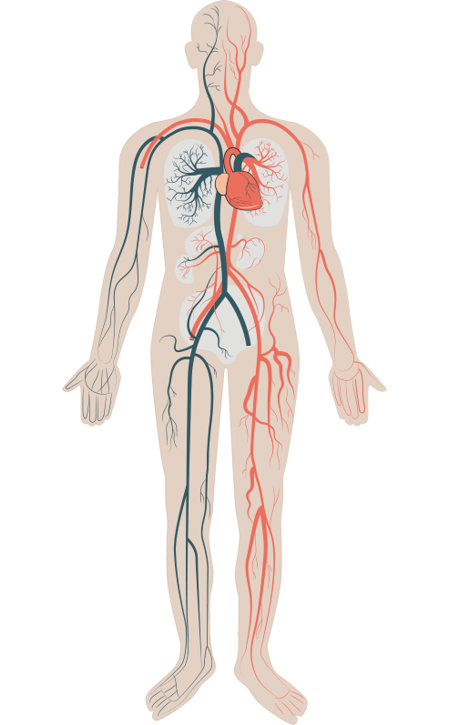

We Give Our Utmost Care to
Better Safeguard Patients’ Health
Hepalink is a leader in the heparin industrial chain segment and one of a few biopharmaceutical companies with vertically integrated capabilities covering the entire heparin industrial chain
All of Hepalink’s enoxaparin sodium injections are made of the company’s own heparin APIs, and are completely traceable

 Prophylaxis of VTE
Prophylaxis of VTE Anticoagulant in ACS treatment
Anticoagulant in ACS treatment Treatment of VTE
Treatment of VTE Anticoagulant in hemodialysis
Anticoagulant in hemodialysis1 drug adopted for treatment in
4 therapeutic areas

·ACC9 Guideline
·Recommended by the China Guideline issued in 2015
·6-14 days of prophylaxis (LMWH/LDUH/mechanical prophylaxis) in hospitalized high VTE risk patients with a Padua score≥4
·Cancer patients with venous thromboembolism (VTE)
·Cancer patients with thrombocytopenia
·Patients undergoing major orthopedic surgeries require routine prophylaxis of VTE that should be determined by the VTE risk score
·Medicinal prophylaxis is required in patients with Caprini score ≥2
·Enoxaparin can significantly reduce the incidence of DVT and PTE without increasing the risk of excessive bleeding in patients who received major orthopedic surgeries
·Patients with brain tumors
·Transient ischemic attacks
·2014 AHA and ACS Guidelines
·2018 ECS Guideline
·2020 Guideline for the primary care of patients with STEMI
·Chinese expert’s consensus on the use of enoxaparin for anticoagulation in patients with ACS
·The TIMI 11B study
·Unstable angina
·Non-ST-elevated myocardial infarction
·Acute ST-elevated myocardial infarction
·Acute heart failure patients on medical treatment
·Hospitalized patients with atrial fibrillation
·ICU-treated COVID-19 infected patients with underlying heart diseases or prior cardiovascular events
·Pregnant women with heart diseases
·The 2015 guideline issued in China recommends 6-14 days of prophylaxis (LMWH/LDUH/mechanical VTE prophylaxis) in hospitalized high VTE-risk patients with a Padua score≥4
·Patients with mid/high VTE risks receiving:
- Orthopedic surgery
- General surgical treatment
- Surgical cancer treatment
·2015 consensus on the comprehensive prevention of thrombosis: patients with TIA should be considered for LMWH treatment as early as possible. The consensus also recommends to combine LMWH with mechanical VTE prophylaxis
·Patients with severe COVID-19 infections and those hospitalized for the infection
·Patients with acute diseases including impaired respiratory functions or severe infections
·Patients with deep venous thrombosis or pulmonary embolism (PE), excluding those PE patients who may need thrombolytic therapy or surgical treatment
·ACOG Guidelines: LMWH is the preferred anticoagulant for the prevention of thrombosis during pregnancy
·Enoxaparin does not cross the placenta, is therefore safer to the pregnant woman and the fetus
·Meta-analysis showed that LMWH can improve the rate of live birth and reduce abortion
·Chinese Experts’ Consensus on the Use of LMWH in the Prevention of Spontaneous Abortions has commended LMWH in the prevention and treatment of RSA patients with PTS, APS, or AID etc**.
** RSA, recurrent spontaneous abortion. PTS, postthrombotic syndrome. APS, antiphospholipid antibody syndrome. AID, autoimmune disorder
·Chronic kidney disease patients with VTE
·Extracorporeal circulation during dialysis
·Rheumatic disease patients with VTE
·ASCO, ESMO, NCCN, and BJH Guidelines
·Patients awaiting or received liver transplants
·WHO recommendations for the prevention of VTE associated with COVID-19 infections
·Pregnant women with heart diseases
·Potential Applications* :
- Recurrent spontaneous abortion
- Antiphospholipid syndrome
- Prethrombotic state
·Based on Caprini risk modeling, Guideline recommends LMWH as anticoagulant in surgical patients with mid/high VTE risk (Caprini score >3)
·Acute lymphocytic leukemia
·Cancer patients with thrombocytopenia
·Rare hereditary hemorrhagic diseases
·The 2016 ACCP guideline for the prevention of VTE in non-orthopedic surgical patients recommends LMWH for anticoagulation in surgical patients with mid/high VTE risks (Caprini score>3)
·High thrombotic risk patients receiving high-risk endoscopic surgeries